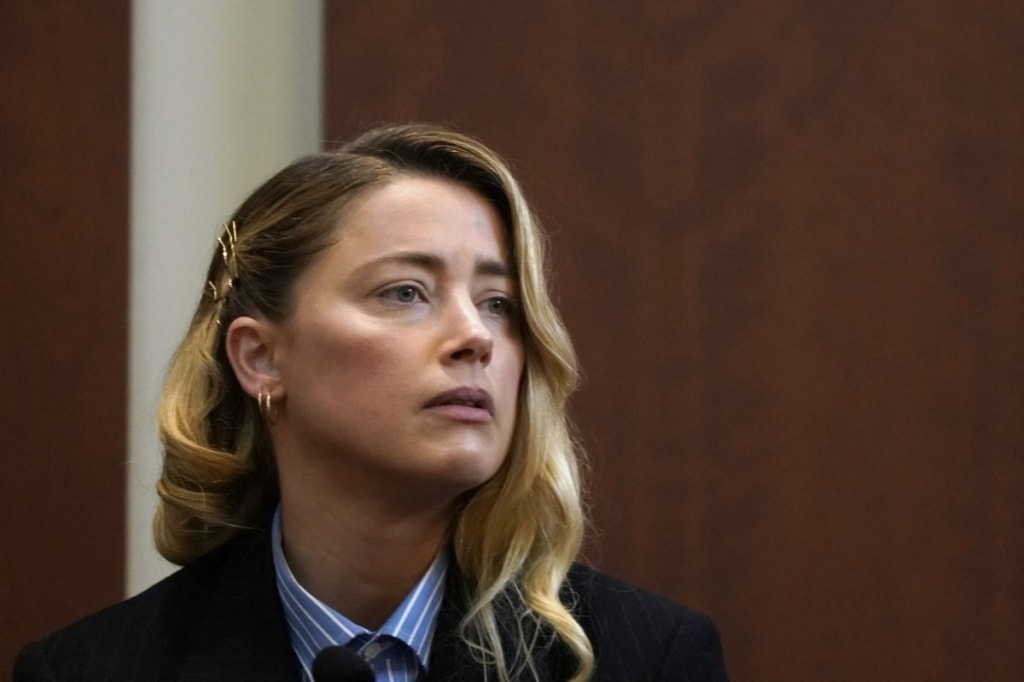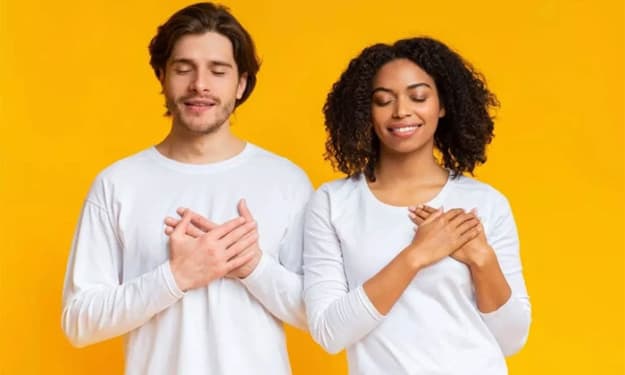Stop Telling Victims That If They’re Truthful They Will Win a Defamation Suit
Implicit bias and the myth that the truth will set you free.

As the news of the Depp V. Heard verdict was announced June, predictably, the internet exploded with controversy. For so long I had been keeping myself as distanced as possible from the details of the case, but I eventually broke down and began to follow the discourse religiously.
Although my unquenchable curiosity for the culture hasn’t killed me yet, this week it came pretty close.
Just as I suspected, social media was a dumpster fire. Heard supporters squabbled with Depp’s loyal followers — both acting as armchair psychologists — about certain mannerisms and body language that apparently gave them enough information to judge whether one was lying or not.
Interestingly enough, not everyone was in agreement about the “obvious” truth that was supposedly revealed throughout the six-week televised trial.
Coming to terms with the fact that my opinion of who abused who has shifted way too many times, I decided to pay more attention to the discussion focused on what this circus of a trial by general consensus means for #MeToo and survivors of abuse.
Many argued that since the suit set a precedent for what can now be considered defamation, the verdict would possibly embolden droves of abusers to file against their victims. The looming threat of being sued will cause survivors to be more fearful than ever of coming forward.
I can’t say I disagree. Although wealthy abusers already have been known to sue their victims or workplaces after facing allegations of abuse, and this ridiculous precedent for defamation had already existed, I suspect this case is going to make defamation suits completely mainstream.
As we typically lack nuance when it comes to serious and complex issues, Depp's followers took offense to the idea that this verdict could be anything but positive for survivors. Failing to understand that this completely separate idea is not necessarily in opposition to Depp, his supporters didn’t hold back.
They armed themselves with a few ad nauseam defenses — one of them being the adorable myth that “if you don’t lie, you should have nothing to worry about.” To my surprise, flocks of commentators seemed to agree that if you tell the truth, it’s not possible for you to lose a defamation case.
The truth doesn’t always matter.
Ironically, this beautiful lie was something I told myself to get through my defamation case. Yes. I was sued for defamation because I wrote my own #MeToo essay. That’s how I know how inaccurate— to say the least — this argument is.
When I received notice of the claims against me, I had to decide whether I was willing to play the long game and fight for my right to speak — even though I technically couldn’t even afford an attorney. I’m ridiculously privileged to have found one who was willing to defend me pro bono.
This does not typically happen for victims. A defamation suit— and the civil system in general — relies on the assurance that a defendant will usually have little to no choice but to submit to whatever the plaintiff requires out of fear for their finances.
My attorney was more concerned about minimizing the amount of trauma I would be subjected to than he was about winning big for his firm. His advice was very balanced, but it was clear that he wanted to avoid going to trial. This confused me because I was so confident that having my day in court and proclaiming my truth could only end in justice being served.
He told me that the truth is solid, but it’s not necessarily what matters. According to him, everything depended on the jury. Our county was a mixed bag of political views, which made it impossible to predict who would be showing up that morning.
Americans love to pretend like we don’t see color or race or gender, but in reality, every single one of us has implicit or unconscious biases.
There was little to no physical evidence between the plaintiff and me. The case was made up of two narratives. That’s all. Which of us would be believed, and what would that belief be based on?
There came a point within the excruciatingly long civil process when I realized that there was a team of people who were hired to destroy my credibility. Any mistake I’ve ever made in my entire life could be used against me.
The defamation attorney, who had no doubt experienced hundreds of cross-examinations throughout his career (and I, none), was highly anticipating my memory failures and slightest inconsistencies.
I’d be asked the usual victim-blaming-disguised-as-relevant questions. Why didn’t you tell anyone right after it happened? What did you do afterward? Why didn’t you go to the doctor or the police? Why did you continue to talk to the plaintiff after?
These questions are completely farcical to anyone who knows the fundamentals of abuse — which tells me that a majority of the general public doesn’t because they all found similar questions completely reasonable when asked of Amber Heard.
What character evidence is substantial enough for a jury of armchair experts to believe me about an event that involved two people behind closed doors?
The standard is indefinable because it depends on the judge and the jury, who will be unique in each civil case. But one thing is for sure. There are people on every jury that will value the words of some over those of another for reasons that have nothing to do with the content of the narrative.
My fate would ultimately be left in the hands of people who already have their own distinct opinions, informed or misinformed, about #MeToo and progressive women.
If we went to trial and the majority of the jury was made up of MAGA hat-wearers, boy-moms, or anyone who could relate to, sympathize with, or see themselves in the plaintiff, the truth probably wouldn’t be enough to save me. This is why my attorney strongly suggested that I ruminate on the possibility of a settlement.
I’ll never understand how a defamation case can be so widely recognized as fair or accurate judgment.
Even though losing the case would have sentenced me to a life of poverty after an agonizing re-traumatization of publicly re-counting events that will forever haunt me, on top of the re-traumatization from the process of a dragged-out civil suit that required I dig up every text message to remind me of each traumatic aspect of what I’d already experienced, on top of the initial traumatization of said events that I had barely even processed yet— I was determined to fight for my truth.
However, after witnessing the Depp v. Heard trial, the media smear campaigns surrounding it, and the public response to an imperfect woman on the stand, I’m almost glad I decided not to.
During the civil process, all I could think about was how I couldn’t wait until it was finally over. It never occurred to me that it may never be over. Even long since the case has been settled — which was supposed to feel satisfying but didn’t — I now have to contemplate whether every word I write could offend someone who has the money to silence me.
I will always have to be extra cautious when I speak about my own goddamn lived experience because someone could be watching.
All of this nonsense just because I am not wealthy. Someone decided they didn’t like what I said, and the consequences taught me that freedom of speech is not for all.
If anyone is wondering what censorship actually is…
Defamation cases are not black and white. The verdicts are seldom “obvious.” They are a lot of paperwork, reading, gathering, analyzing, memorizing, strategizing, and game-playing back and forth for months to years, all leading up to a few days that will hinge on luck.
Luck has absolutely nothing to do with the truth.
If you think that justice shall always prevail, bless your heart. The wealthy own defamation cases, whether they are telling the truth or not. If someone has the money, time, and bandwidth, they can control the voices of people who lack those things — in America, the land of the free.
Our system is far from perfect. We need to pull the wool from over our eyes and admit that.
The elites have always weaponized the fact that the general consensus of the public can greatly affect our behaviors, perspectives, purchase habits, and even our choices at the ballot box. But within the last ten years, we’ve seen political campaigns, PR firms, and wealthy public figures utilize much more advanced technology in order to effectively control our biases through mass manipulation.
When we have high-profile cases such as Depp V. Heard, how can we consider a jury partial, especially if they are not sequestered? What jury could possibly be reliable in a case involving major celebrities?
Even within the victim and advocate communities, we are at odds in regard to this case. How can we possibly qualify ourselves to judge any victim’s reaction to abuse?
My case was not even close to high-profile, but it’d be naive of me to ignore the way that these patterns conveyed through pop culture events trickle down to us all. Even if you believe that Johnny Depp is the survivor of Amber Heard’s abuse, do you really believe that this case is going to have a positive impact on non-celebrity male victims?
This case is the furthest thing from an authentic representation of what male victims will have to endure through the civil system. These victims who now feel more empowered to speak out — which should be something to celebrate — may, unfortunately, face a higher chance of intimidation through civil lawsuit.
Our victim-blaming culture, which is already considerably unkind and unsupportive of male victims, is only going to regress.
When you tell a victim that they should have nothing to worry about as long as they tell the truth about their abuse, you’re overlooking the classist civil system that was set up to fail them. You’re overlooking the painful realities of trauma that are built into the outspoken survivor’s experience.
To any of you who think this line is a clever retort or valid point, your ignorance could contribute to false hope and dangerous misconceptions surrounding abuse.
If you are genuinely concerned about male victims, or any victims for that matter, educate yourself and get involved in advocacy. We need to fight for their rights and lobby for more equitable practices in criminal and civil court proceedings.
At the very least, we all need to use discernment and critical thinking when it comes to anything we consume on social media, especially if it is something that validates our own biases.
About the Creator
Enjoyed the story? Support the Creator.
Subscribe for free to receive all their stories in your feed. You could also pledge your support or give them a one-off tip, letting them know you appreciate their work.






Comments
There are no comments for this story
Be the first to respond and start the conversation.